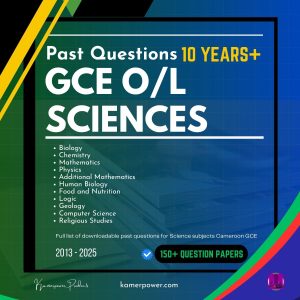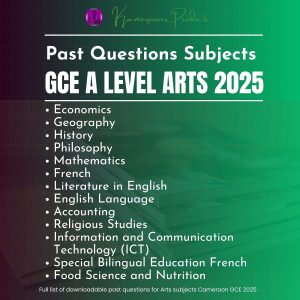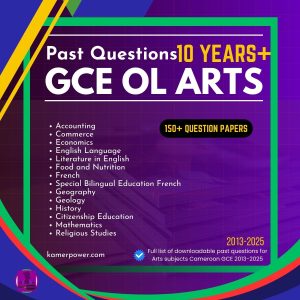A Level 730 English Language syllabus Cameroon GCE Board
Contents
Cameroon GCE Board A Level English Language syllabus 730
730 ENGLISH LANGUAGE
Cameroon GCE Board A Level English Language syllabus.
Kamerpower team always have its students best interest at heart, so we always make sure we bring to your door step any article that will be of help to you all, especially as all GCE candidates preparing for their registered subjects this year. Cameroon GCE A Level English Language syllabus.
-
INTRODUCTION
The syllabus and examination schemes have been designed to take into account the needs of different groups of students, institutions of higher learning, professions and employers. Advanced Level English also aims at enhancing social interaction. It is assumed that the syllabus will be taught to candidates who have taken English Language Ordinary Level course. It is hoped that this will improve on the standards of English in Cameroon.
2. AIMS
The general aims of the syllabus are:
- to encourage the teaching and learning of the four basic language skills i.e. listening, speaking, reading and writing in an integrated manner.
- to encourage the development of thinking skills e.g. critical, analysis, induction/deduction, synthesis, inference; etc.
- To encourage communication in speech and writing.
- To promote the use of English Language as a national and international language
- To encourage extensive reading and listening, and responding in various ways.
3. GENERAL OBJECTIVES
Candidates will be expected to demonstrate their ability to
- Understand and convey information.
- Understand, select, order and present facts, ideas and opinions.
- Evaluate information in reading material and in other media and select what is relevant to specific purposes.
- Recognize implicit meaning and attitude
- Show a sense of audience and awareness of style in a variety of situations.
- Listen, understand, speak and write English that is acceptable in national and international circles.
- Exercise control of appropriate structures and conventions, including punctuation and spelling.
- understand the current trends in English Language including social appropriateness and gender sensitivity.
- develop the ability to write for a variety of purposes and audiences in a variety of forms
- build competence in the different registers in English.
4.ASSESSMENT OBJECTIVES
- a. Reading Comprehension, Composition and Summary will assess Knowledge, Comprehension, Application, Analysis, Synthesis and Evaluation.
- Grammar and vocabulary will assess knowledge, comprehension and application and Analysis .
- School-based projects and spoken English will assess knowledge, comprehension, application and analysis,Synthesis and Evaluation.
4. STRUCTURE OF THE EXAMINATION
Evaluation will be done in two parts: School- Based Projects and Spoken English; and the Written Examination
1. School- Based Projects and Spoken English
Evaluation of School-based projects and spoken English will be carried out through continuous assessment and an oral test.
2. Written Examination
The written examination will consist of TWO papers for a total of FOUR hours.
PAPER 1
This will consist of 50 Multiple Choice Questions to be answered in 1 hour 30 minutes and distributed as follows:
Section A – Reading Comprehension.
Section B – Grammar.
Section C – Vocabulary.
PAPER 2
This will consist of THREE Sections to be answered in 2 hours 30 minutes.
Section A – Summary and text reconstruction.
Section B – Composition.
Section C – Prescribed texts.
The structure of the examination is represented in the following table:
[kp_accordion]
[kp_spoiler title=”click here” style=”fancy”]
| Paper | Section | Name | Type of Questions | Duration(Minutes) | No ofQuestionsset | No ofQuestions to be answered | Marks | Weighting |
| 1 | A | ReadingComprehension. | MCQ | 50 | 16 | 16 | 16 | 30 % |
| B | Grammar | MCQ | 25 | 22 | 22 | 22 | ||
| C | Vocabulary | MCQ | 15 | 12 | 12 | 12 | ||
| Total | 3 | 1 h 30 | 50 | 50 | 50 |
[/kp_spoiler]
[/kp_accordion]
6. THE SYLLABUS CONTENT
6.1. SCHOOL- BASED PROJECTS AND SPOKEN ENGLISH
Aims
- Encourage the practical use of English by making learning more participatory and
- Learner-centered.
- Encourage creativity.
- Generate group work and group interaction
- Encourage the teaching and learning of listening skills.
- Build self-confidence and self-esteem
- Enable learners to adapt to different situations, settings and varied tasks.
- Encourage the spirit of inquisitiveness and research.
- Encourage listening with understanding to varied material.
- Increase learner’s vocabulary.
- Encourage responding in various ways to textual material on different topics.
Objectives
- Enable learners to freely and confidently express themselves in a variety of settings and situations.
- Enable students to become creative, inquisitive and develop the capacity for research.
- Enable the learners to develop a sense of communal and participatory approach in solving problems or addressing given situations.
Content
Debates, interviews, coverage of real and imaginary events, meetings, addresses and speeches, group productions such as poems, short stories, articles, plays, editing, conversations, commentaries; etc.
6.2. WRITTEN EXAMINATION
Paper 1
A. READING COMPREHENSION
Aims
- Encourage the teaching and learning of reading skills
- Encourage reading with understanding of textual material on varied topics.
- Increase learners’ vocabulary.
- Foster a love for extensive reading.
Objectives
- Test the ability to read various kinds of material.
- Test the ability to respond in different ways to various kinds of material.
- Test the ability to infer the meanings and use of words in context.
Content
- The examination will be set on one or more passages totaling about 1,000 to 1,500 words in length. The passage may not have the same subject matter. There will be a total of 16 questions in this section; they will be of multiple-choice type and carry a total of 16 marks.
B. GRAMMAR
Aims
- Encourage the learning of grammar which is the basis of the English Language.
- Encourage the application of rules of grammar.
- Improve communication since there is little effective communication without an adequate language base.
- Encourage understanding of the basic features and functions of the English Language.
OBJECTIVES
- Enable the teacher and the learner to pay more attention to grammar.
- Enable the learners to understand, and be understood.
Content
This section will consist of 22 multiple-choice questions and will carry 22 marks.
C. VOCABULARY
AIMS
- Encourage learners to increase their vocabulary use.
- Encourage him/her to pay more attention to word use.
OBJECTIVES
- Enable the learner to understand the meaning of words in context.
- Enable the learner to understand and use a wide range of idioms and figures of speech.
Content
This section will consist of 12 multiple-choice questions and will carry 12 marks.
Paper 2
A. SUMMARY AND TEXT RECONSRUCTION
Aims
- Encourage learners to identify and extract important and relevant information from a text.
- Encourage learners to use the information to write clearly and coherently a specified number of words and paragraphs.
- Encourage learners to write with a purpose and for a particular audience
Objectives
Enable learners to:
- respond to stimulus material,
- select and present facts,
- review, organize and edit varied texts,
- write different text types,
- slant and format information appropriately,
- respect word and paragraph limits.
Content
- This section will consist of TWO questions, a text for direct summary and a text for reconstruction and/or correction and will carry 30 marks i.e. 15 marks for each question.
B. COMPOSITION
Aims
Encourage learners to:
- write English accurately, with correct spelling, punctuation, grammar and good handwriting.
- express themselves in correct English.
OBJECTIVES
Enable learners to:
- acquaint themselves with a variety of written modes.
- show relevance to the topic chosen.
- be creative.
- arrange their ideas logically and coherently.
- express an appropriate point of view and show a sense of audience.
- engage in independent reflection inquiry.
Content
- This section will consist of SIX composition topics for candidates to write on ONE and will carry 20 marks.
C. PRESCRIBED TEXTS
Aims
- Expose learners to various types of texts
- Encourage learners to cultivate a reading culture
- Encourage learners to read extensively
- Encourage the teaching and learning of reading skills
Objectives
- Enable the learner to understand to various text types
- Enable the learner to read, analyze and evaluate different forms of information
- Enable the learner to identify and respond to main ideas of texts
- Enable the learner to use the information to write clearly and coherently
- Enable the learners to be creative
Content
The examination will be set on FOUR prescribed texts. Candidates will be expected to use information from the texts and respond appropriately. There will be a total of FOUR questions to answer ONE. They will be of essay type and will carry 20 marks.
SYLLABUS GUIDELINES
7.1. SCHOOLS- BASED PROJECTS AND SPOKEN ENGLISH
Learners will be expected to:
- participate in group productions such as writing and producing sketches, poems, short stories, plays, etc.
- edit extracts from texts, newspapers, journals, etc.
- listen to news and make reports
- read newspapers, magazines and give oral/ written reports
- carry out interviews with personalities and get opinion on a variety of topics
- report on proceedings of meetings, seminars, workshops, conferences, etc.
Candidates are expected to keep a record and portfolio for eventual evaluation.
Candidates’ progress reports will be used as part of the evaluation.
In spoken English, candidates will be evaluated on:
- level of articulation and discrimination.
- pronunciation, stress and intonation.
- fluency (use of tenses, agreement and clarity of presentation).
- logical organization.
- correct grammar use.
- appropriate word choice.
- appropriate gestures.
- enthusiastic and interesting presentation.
- adequate knowledge of the subject.
- audience rapport.
2. READING COMPREHENSION
Candidates will be expected to:
- answer different types of questions on the passage (s).
- answer questions related to the grammar, vocabulary and literary aspects of the passages.
- recognize the main idea and supporting details in textual material.
- select essential information from a paragraph.
- identify the writer’s purpose, point of view and intended meaning; also make inferences using logical reasoning.
- identify the meaning of words and expressions (including unfamiliar ones) in context; interpret figures of speech.
- identify the writer’s attitude to his/her subject.
- provide solutions to a problems.
- read to identify chronological order in a series of events in a passage.
- differentiate between facts and opinion, and make out other people’s views on a subject.
- summarize; synthesis information from more than one source; recognize
- similarities between ideas in texts.
- identify text type: speech, lecture, story, etc.
- identify parts of speech.
- recognize discourse markers: enumeration, addition, contrast, cause and effect, illustration, etc. Recognize markers for exemplification and explanations, and sequence indicators
- recognize redundancies: restatements, repetitions, oppositions, explanations, examples.
- understand relations between parts of a text through lexical cohesive devices as well as grammatical cohesive devices, e.g. pronoun references (e.g. it, she, etc.).
- use critical reasoning to evaluate textual material.
3. GRAMMAR
Candidates will be tested in:
- main parts of speech: noun, verb, adjective, pronoun, adverb, preposition and conjunctions.
- noun: count and non-count nouns; note should be taken of nouns that do not take plural forms, (e.g. information); quantifiers (much, a lot of, etc.) should be used. correctly
- the verb: tenses, mood, modals (can, may, etc.), voice; reported speech.
- verbals: gerund, infinitive and participle.
- the pronoun: all the forms. (avoid confusion with possessive adjectives).
- the preposition: (including correct combination with other words and when to be omitted).
- determiners and articles.
- the sentence: agreement; fragments, run-on sentences, dangling and misplaced modifiers.
- the clause: noun, adjective, adverb.
- the phrase: noun, adjective, adverb, proposition.
- comparatives and superlatives.
- conjunctions.
- word order: NB word order in questions, indirect questions; in some phrases: adjective and noun; main verb and auxiliary; enough and adjective; participle and adverb; relative pronoun and preposition.
- word forms: how these alter depends on the position in the sentence and the part of speech.
- punctuation
4. VOCABULARY
Candidates will be tested in:
- word choice:correctness and appropriateness of words; avoid redundancy and malapropism;
- recognize simple connotations and figures of speech;
- affixes; prefixes and suffixes;
- formation of words;
- synonyms and antonyms, homonyms,
- words often confused. etc
- expressions: figurative; idiomatic.
- spelling.
- correct usage of English.
7.5. SUMMARY AND TEXT RECONSTRUCTION
The text type include:
- Informal letters.
- Formal letters.
- Newspaper Articles.
- Reports.
- Speech.
- Debate.
- Talk.
- Minutes of a meeting.
- discourse.
- lectures.
- stories
6. COMPOSITION
The essay will be assessed under:
Content and Organization: The writing will be expected to show relevance to the topic, creativity, logical arrangement of ideas and paragraphing, liveliness and freshness of imagination and progressionfrom the introduction through the development to the conclusion. There should be an appropriate point of view, and a sense of audience.
Expression: The candidate’s writing should reflect a range of skills of expression and appropriate style in relation to the content. Credit will be awarded for positive qualities such as clarity, coherence, adequacy, range and aptness of vocabulary, judicious and imaginative use of figurative language and ability to suit tone to the reader and purpose.
Accuracy: Candidates will be expected to write accurately, without lapse in syntax and sentence structure. Common words should be spelt correctly and punctuation should contribute to the sense, rather than impede it. Although quality is more important than quantity the composition should not be less than 450 words in length. There will be a proportionate deduction of marks if the composition is shorter than this.
Content
a. Narrative.
b. Descriptive.
c. Expository and discursive.
d. Argumentative.
e. Letter writing; formal letters; informal letters.
f. Open-ended (one-word).
g. Reacting to visual stimuli: Pictures, cartoons, etc.
N.B: Candidates:
h. should be trained to use the name and address provided to conceal their identity.
i. must suit their style and point of view to the reader and kind of writing
j. must not use obscene language.
7.7. PRESCRIBED TEXTS
Candidates will be tested on the ability to:
- analyse different forms of information e.g. similarities and differences, advantages and disadvantages, problems and solutions, cause and effect, action and consequence etc.
- identify and respond to main ideas such as sequence of argument, drawing conclusions, stating facts and opinions.
- develop ideas coherently with appropriate words and sentences.
- identify the writers’ purpose and intended meaning.
- summarize and synthesize information from prescribed texts.
- use critical reasoning to analyze and evaluate texts.
Candidates will be assessed more on expression, accuracy, clarity, coherence, adequacy range and aptness of vocabulary, judicious and imaginative use of figurative language and the ability to appropriately link essay with prescribed texts.
A: TEXTBOOKS
Etherton, A.R.B (n.d.). Mastering Modern English
Students’ Companion
Simo, B.A. (n.d.) Watch your English.
The New First Aid in English
Ndongmanji. (n.d.) Basics of Traditional Grammar. Pearson Longman
B. PRESCRIBED TEXTS
Lake God by Bole Butake
Collection of essays
Collection of poems
Collection of short stories/novel
Science fiction
C. REFERENCE MATERIAL FOR TEACHERS
- Writer’s Choice: Composition and Grammar
- The Writer’s Handbook
- Cambridge University Press Material.
Recommendation
- Cameroon GCE O Level English Language syllabus.
- Cameroon GCE A Level Physics syllabus.
- Cameroon GCE board O Level Mathematics syllabus
- Cameroon GCE board O Level Additional Mathematics syllabus.
Cameroon GCE Board A Level English Language syllabus
Related Study Materials:
-
Sale!

Download O/Level Science Past Question Papers GCE 2010-2025
Original price was: 14500 CFA.11500 CFACurrent price is: 11500 CFA. Add to cart -
Sale!

GCE AL Arts Subjects Past Questions 2013-2025 Cameroon
Original price was: 15000 CFA.12000 CFACurrent price is: 12000 CFA. Add to cart -
Sale!

Ordinary Level Arts Past Question Papers Cameroon GCE 2010-2025
Original price was: 14500 CFA.11500 CFACurrent price is: 11500 CFA. Add to cart



Is there a particular text book for English Language?…also for the prescribed texts, because i have searched for it but unfortunately i could not get one.
how many hours of ENGLISH do we have in the high school?
if English is 10 hours the we may have more than 40 hrs per week
Felix it depends on your school’s time table…
This material helped me. Thanks
You are welcome Calista.